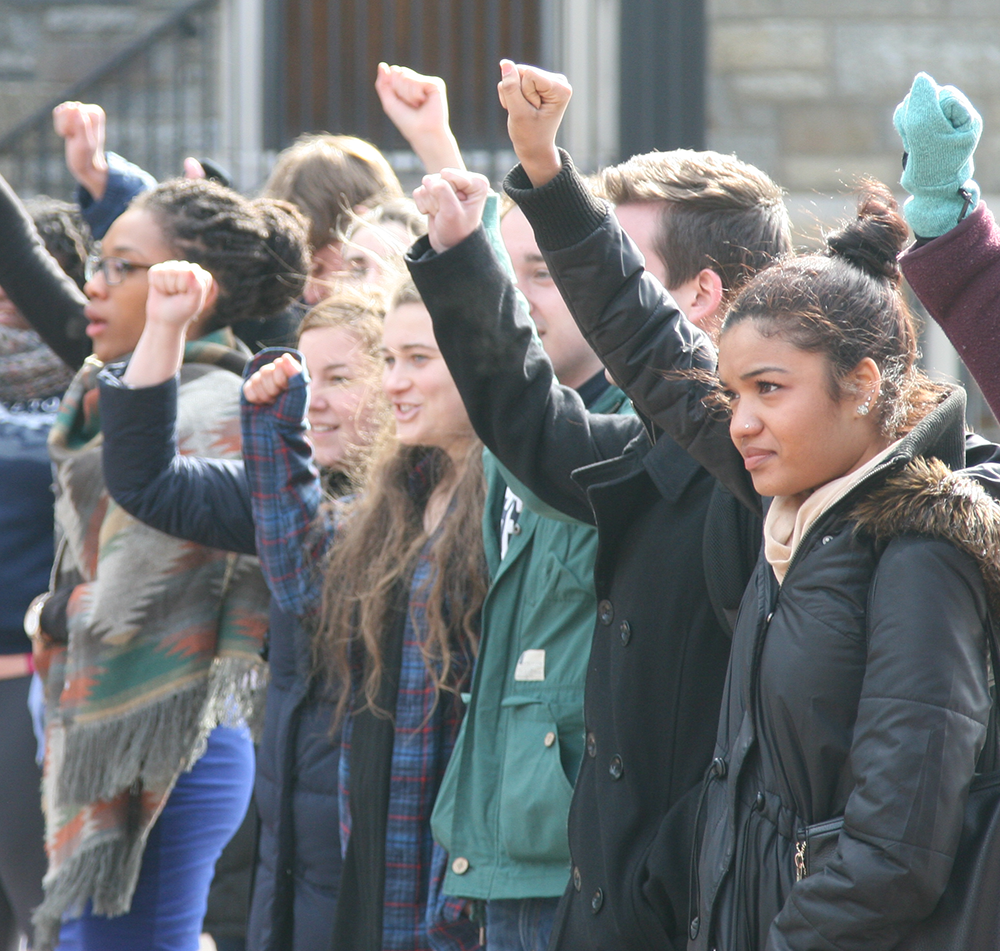Georgetown must continue to facilitate spaces for meaningful dialogue and open exchange of diverse ideas, according to a panel on free speech and expression held Tuesday evening in the Healey Family Student Center Social Room.
The panel, featuring Georgetown University Student Association President Kamar Mack (COL ’19), Assistant Dean for Student Engagement Erika Cohen-Derr, associate professor of government Fr. Matthew Carnes, S.J., and English Department Chair Ricardo Ortiz, convened to discuss the ways that Georgetown can continue to provide outlets for free speech, while also addressing the tensions created between opposing student groups, diverging viewpoints and provocative speakers on campus.
In light of recent bias-related incidents involving anti-Semitic graffiti and swastikas found on campus in LXR Hall and Village C West, the panel discussed how both students and faculty can ensure that students are comfortable expressing their own views and feel safe on campus.
Carnes expressed that it can be challenging — as both a professor and a community member — to navigate the tension between the right of individuals to express themselves and their right to feel safe and respected on campus.
“There are some things that are our values that we absolutely believe in, about the dignity of each person and everyone’s inalienable right to be here, and how every member of our community — in their diversity — contributes to who we are. Those are things that are non-negotiable,” Carnes said.
The panel also discussed the course of action for polarizing or disagreeable speakers on campus.
Mack said that affirming the feelings and positions of dissenting student groups and individuals, particularly those from marginalized or disadvantaged communities, is one of the best ways to encourage free speech on campus.
“We also wrestle with the idea that Georgetown is a place where we need to encourage civil dialogue. The philosophy that I have looking at it is when there is speech that is not in line with the beliefs or values of individuals or communities in question, the response is always more speech,” Mack said. “The response is bringing in alternative perspectives, whether that be a protest or demonstrations or a campaign. To the extent that we can encourage that, we like to do that.”
Cohen-Derr also emphasized the need to cultivate an inclusive mindset on campus that addresses the many sides to a belief or argument.
“The question that I always struggle with is: What are our collective responsibilities to one another?” Cohen-Derr said. “If a student group that espouses a certain view and wants to host a speaker that will really amplify that view and really put those views out there, what is that group’s obligation to those who would feel personally attacked, insulted, hurt, unheard or invalidated by that viewpoint?”
Georgetown has a comprehensive speech and expression policy that outlines guidelines for the “untrammeled expression of ideas and information.” The policy dictates that individuals may not obstruct or otherwise interfere with the freedom of others to express views they reject and holds the university responsible for promoting a lively and fearless freedom of deliberation and debate, while protecting that freedom when others attempt to restrict it.
Carnes said that this policy and its preamble, written by Rev. James Walsh, S.J., illustrate the values that Georgetown holds and guides students and faculty alike in navigating the often murky waters of free speech issues on college campuses.
“It’s really rich and worth reading. It is a policy that both affirms our stance as a university and also our sense of community. I think it’s worth reflecting on,” Carnes said.
The policy also requires any speaker that comes to campus to take questions from members of the Georgetown community. This policy both generates more speech and opens up exchange and ideas on campus, Carnes said.
Ortiz agreed that the university policies underscore the community’s commitment to creating an environment for the civil exchange of ideas. He added that the policies have the power to reach into the classroom and influence discourse.
“For faculty, it’s really important to understand the relationship between these policies and what should happen in the classroom. The production of speech and knowledge [is done] through a set of processes that embrace a kind of freedom, openness and honesty and commitment to the truth,” Ortiz said.





















